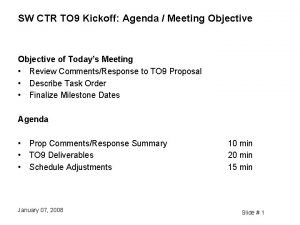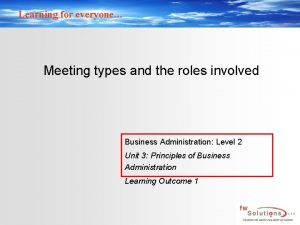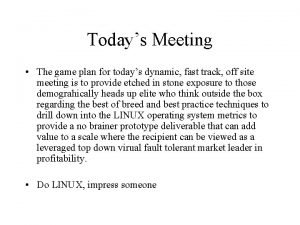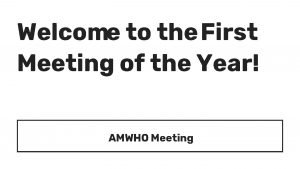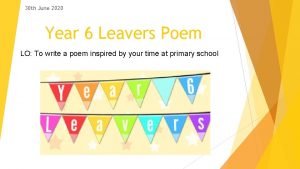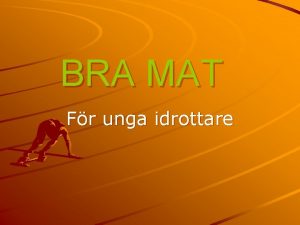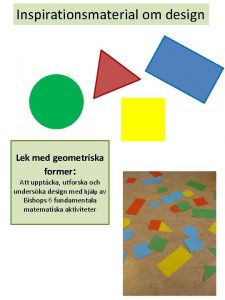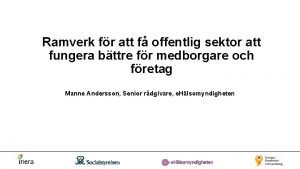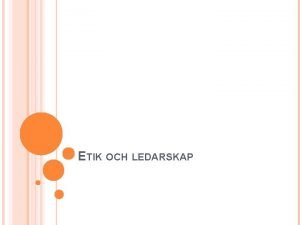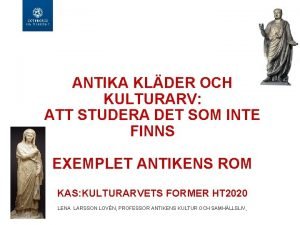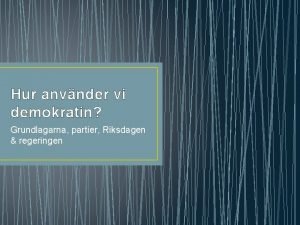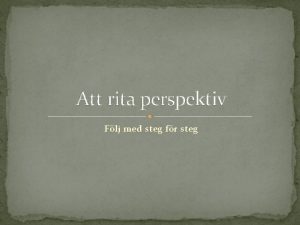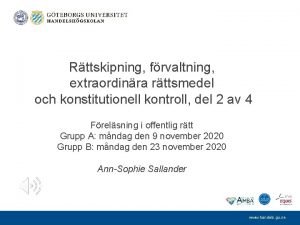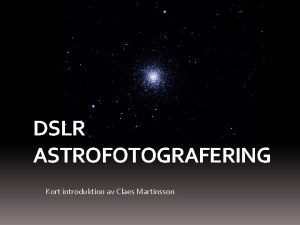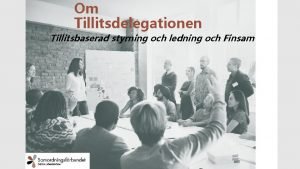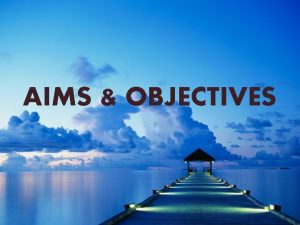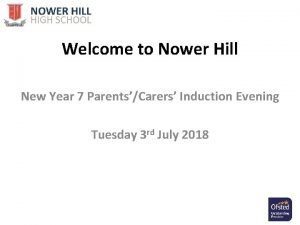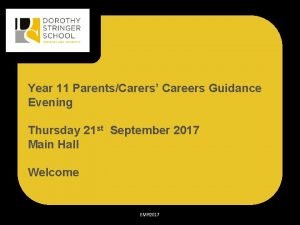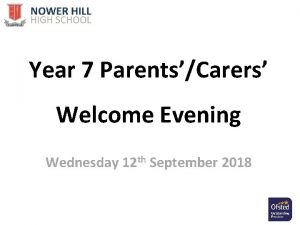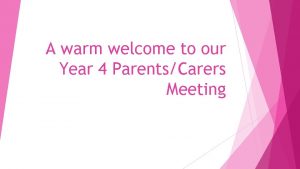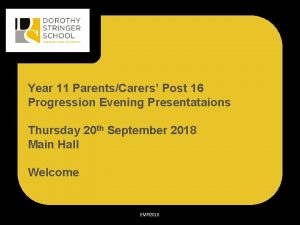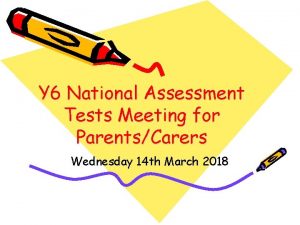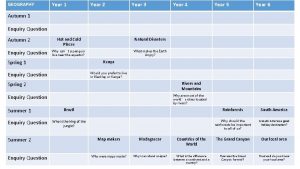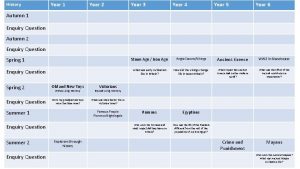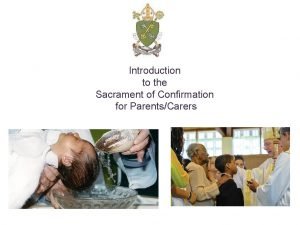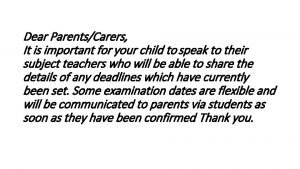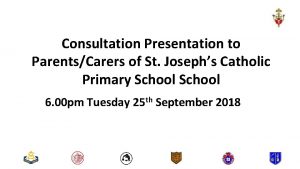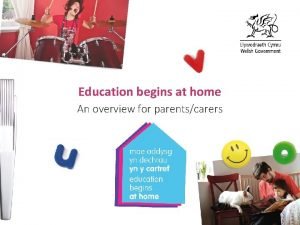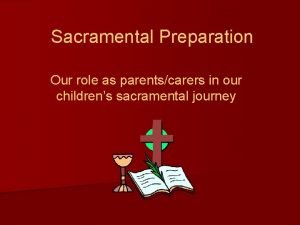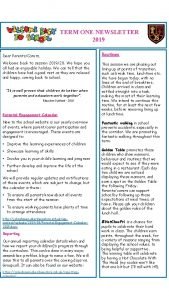Year 1 Aims of meeting For parentscarers of



















- Slides: 19

Year 1

Aims of meeting • For parents/carers of the new Year One children to understand what happens in school as your child enters KS 1. • To reassure if you have any worries or concerns as your child moves out of the Foundation Stage. • To give you opportunities to ask questions.

Autumn term • The children are now in Year 1. They become part of Key Stage 1. • KS 1 is years 1 and 2 and KS 2 is years 3 -6.

Organisation of classes • This year we have two Year 1 classes, and two Year 2 classes.

The curriculum • Children in KS 1 and KS 2 follow the National Curriculum rather than the EYFS curriculum.

Transition from Early Years to Key Stage One • This transition is an important time for your child and we aim to make it as easy as possible. • We recognise KS 1 is different but we don’t make it too different too quickly.

How we support transition into KS 1 • The end of Foundation Stage assessments show us where your child is on their learning journey. • We use this information to help us plan the appropriate learning for your child.

Supporting transition in September • We have similar timetables. • We still allow time for child initiated activities. • Hedgehog classroom is set up with provision areas. • We value inside and outside learning.

Sometimes children work in areas of provision • Areas support children’s learning through the resources we put in there. • They work both inside and outside the classroom.

A typical day for Year 1 8. 45 Morning jobs, such as fine motor skill activities and register 9: 00 Phonics 9. 30 Wake and shake 9: 40 English 10: 15 – 10: 30 Playtime 10. 30 -11. 30 Maths 11. 30 -12. 00 - Guided Reading 12 -1 Lunch 1. 00 Think and drink /changing reading books 1. 15 Topic learning RE/PSHE Geog /Science History PE on Mondays Worship happens everyday.

The curriculum We follow the National curriculum. • We follow a long term plan to ensure we cover all of the curriculum requirements over two years. Some of the areas are repeated but taught at a different level. • Across Key Stage One we cover the same topics but we differentiate according to need.

• The requirements of the curriculum has increased and elements particularly in English and Maths are demanding. It is broken down into Year 1 and Year 2 requirements. • The children are assessed at the end of the year against end of year expectations.

Learning is … • This is a gradual process. • We always teach using praise and encouragement and we do realise that all children are different! • Early emphasis is placed on developing their love of reading.

The National curriculum • Spelling expectations have greatly increased and the children will have weekly spelling homework. • Mental maths knowledge has increased too, so playing a variety of number games would be really helpful. • To develop a deeper understanding in maths we have decided to follow a new maths programme called White Rose.

Principles we believe in • Children having time to explore ideas and interest in depth. • Children learn in different ways at different rates. • Children making links in their learning. • Children initiating activities that promote learning, and enabling them to learn from each other. Making choices and taking some responsibility for their learning. • Creative and imaginative play activities that promote the development and use of language. • Children learning through movement and all their senses. • Children feeling secure, which helps them to become confident learners.

How you can help now • Talk to your child about school. • Let us know about any worries. • Make it a positive experience.

Your support during Year 1 • Continue with supporting your child to read at home. books. Read as much as possible, ideally 5 times a week. • Sharing books • Writing in the reading record - we don’t usually write in these books but it is good for us to see children who are reading regularly. We let you know if there any issues. • Phonic screening check (June) • Interests/Talk to us • Information for parents • Writing for enjoyment • Spelling homework • .

Other info • Behaviour policy • Stickers • Showing work

Any Questions?
 Meeting objective
Meeting objective What is meeting and types of meeting
What is meeting and types of meeting What is meeting and types of meeting
What is meeting and types of meeting For todays meeting
For todays meeting First meeting of the year
First meeting of the year Poem for year 6 leavers
Poem for year 6 leavers Redogör för vad psykologi är
Redogör för vad psykologi är En lathund för arbete med kontinuitetshantering
En lathund för arbete med kontinuitetshantering Mat för unga idrottare
Mat för unga idrottare Geometriska former i förskolan
Geometriska former i förskolan Publik sektor
Publik sektor Etik och ledarskap etisk kod för chefer
Etik och ledarskap etisk kod för chefer Datorkunskap för nybörjare
Datorkunskap för nybörjare Fredsgudinnan
Fredsgudinnan Orubbliga rättigheter
Orubbliga rättigheter Rita perspektiv
Rita perspektiv Ministerstyre för och nackdelar
Ministerstyre för och nackdelar Tack för att ni lyssnade bild
Tack för att ni lyssnade bild Claes martinsson
Claes martinsson Tillitsbaserad ledning
Tillitsbaserad ledning
